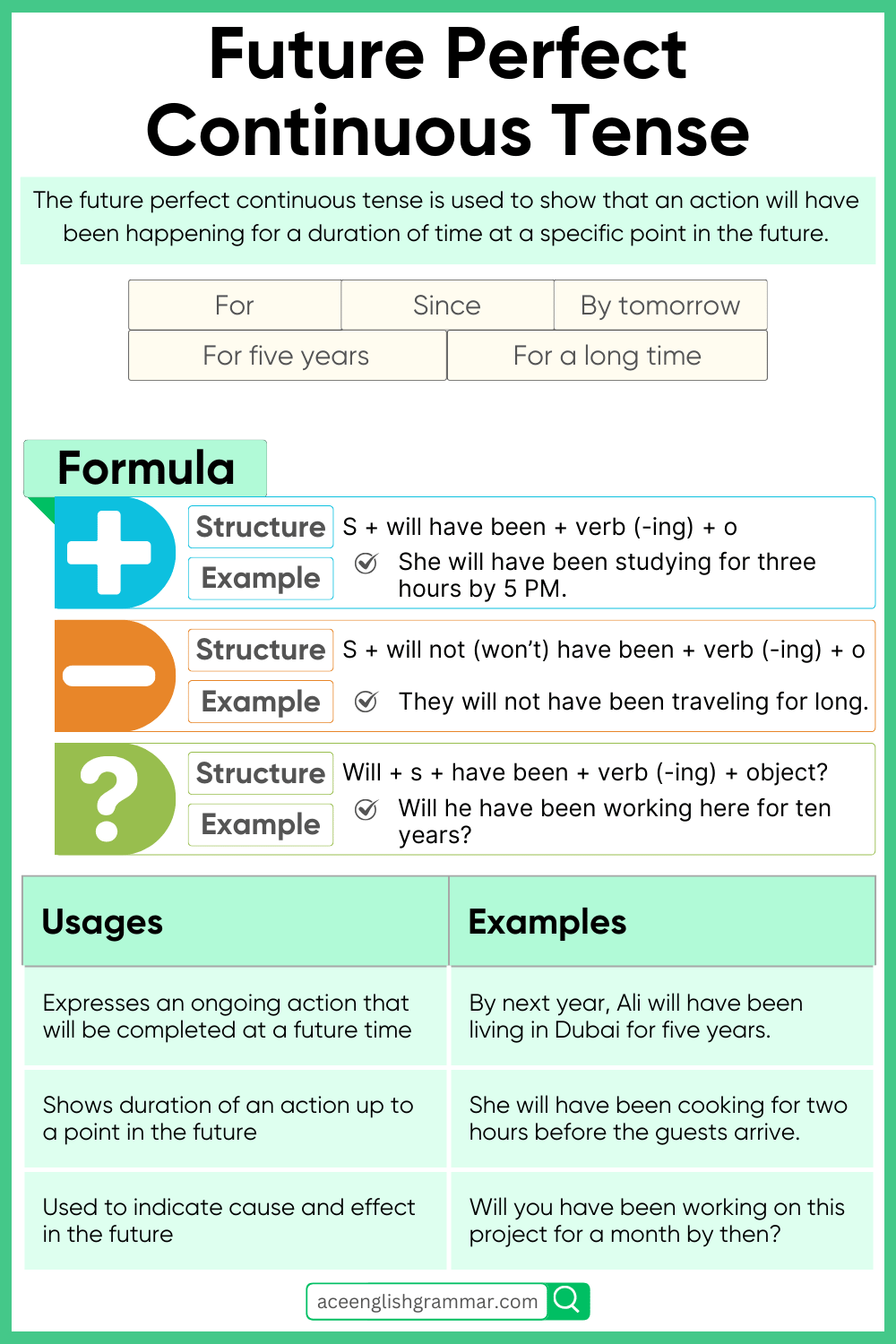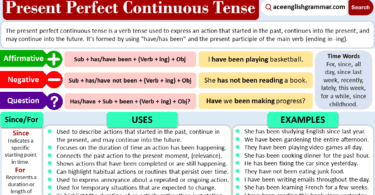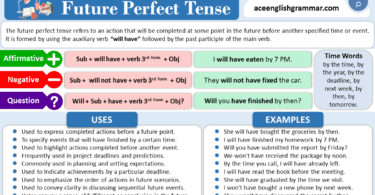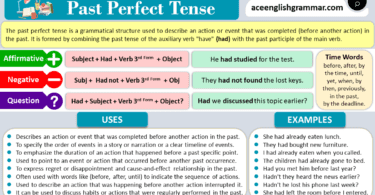English learners often struggle with expressing actions that will continue up to a specific time in the future. The Future Perfect Continuous Tense helps describe such actions clearly. This blog post helps learn the structure, rules, and examples of this tense using easy explanations for beginners.
Table of Contents
What is the Future Perfect Continuous Tense?
Describes actions that will have been happening continuously up to a certain point in the future. This tense emphasizes both the duration and continuity of the action.
- “By next year, I will have been studying English for five years.”
This sentence means that by a future time, the action of studying will have been ongoing for five years.
Structure of the Future Perfect Progressive Tense
Positive Sentences
Structure:
Subject + will have been + present participle (verb + ing) + object
Examples:
- I will have been working all day.
- She will have been studying for hours.
- They will have been playing football.
Negative Sentences
Structure:
Subject + will not have been + present participle (verb + ing) + object
Examples:
- I will not have been working all day.
- She will not have been studying for hours.
- They will not have been playing football.
Interrogative Sentences (Yes/No Questions)
Structure:
Will + subject + have been + present participle (verb + ing) + object?
Examples:
- Will I have been working all day?
- Will she have been studying for hours?
- Will they have been playing football?
Interrogative Sentences (Wh-Questions)
Structure:
Wh-word + will + subject + have been + present participle (verb + ing) + object?
Examples:
- Why will she have been studying late?
- Where will we have been traveling?
- How long will he have been waiting?
Negative Interrogative Sentences
Structure:
Will + subject + not + have been + present participle (verb + ing) + object?
Examples:
- Will I not have been waiting for a while?
- Will they not have been studying all night?
- Will he not have been living here for a month?
Using “Since” and “For” with Future Perfect Continuous Tense
- Since: Specifies the starting point of the action.
- Example: I will have been studying English since January.
- For: Specifies the duration of the action.
- Example: They will have been working on the project for two hours.
Time Expressions Commonly Used
- By the time
- Since
- For
- By
- Until
- All day
- By tomorrow
- Before long
- In a while
Uses of Future Perfect Continuous Tense
- Ongoing Action into the Future:
Describes actions that will be ongoing up to a specific future point.- Example: By tomorrow, I will have been studying for six hours.
- Emphasizing Duration:
Highlights the duration of an action until a certain point.- Example: By next year, they will have been living in the city for a decade.
- Anticipation of Completion:
Expresses the expectation of an action being completed by a certain time.- Example: By the time you arrive, I will have been working on the project.
- Events Leading Up:
Describes events that will have been happening up to a future occurrence.- Example: By the time the concert starts, the band will have been rehearsing all day.
- Predicting Ongoing States:
Predicts an ongoing state or condition until a future point.- Example: By the end of the week, she will have been practicing yoga for a month.
Future Perfect Continuous Tense Examples Sentences
- I will have been waiting for an hour.
- They will have been studying since morning.
- She will have been practicing the piano for months.
- We will have been working on the project by then.
- He will have been teaching at the school for ten years.
Future Perfect Continuous Tense Chart
| Aspect | Formula | Example |
|---|---|---|
| Affirmative | Subject + will have been + verb (ing) + object | She will have been studying for hours. |
| Negative | Subject + will not have been + verb (ing) + obj | He won’t have been working on the project. |
| Interrogative | Will + subject + have been + verb (ing) + obj? | Will they have been waiting for a long time? |
| Wh-Questions | Wh-word + will + subject + have been + verb + obj? | What will you have been doing before the party? |
| Neg. Interrog. | Will + subject + not + have been + verb (ing) + obj? | Won’t they have been studying for the exam? |
FAQs
It is used to describe an action that will be ongoing up to a specific point in the future.
The structure includes “will have been” followed by the present participle (verb + ing).
It is used to emphasize the duration and continuity of an action up to a specific future time.
Use “since” to indicate the starting point, and “for” to express the duration of an ongoing action.
I will have been studying for an hour.
They will have been waiting at the station.
Read More





Leave a Comment